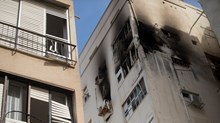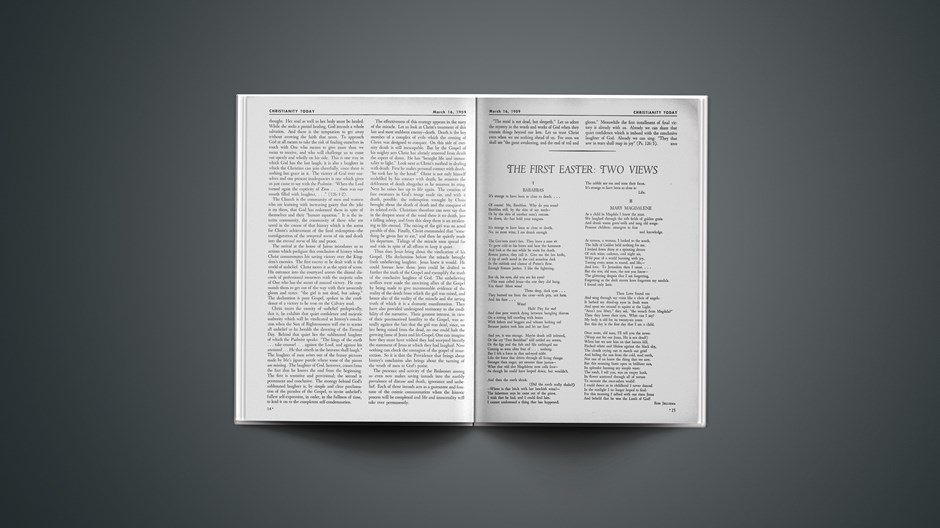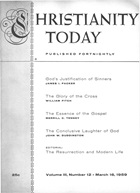I
BARABBAS
It’s strange to have been so close to death.…
Of course! Me, Barabbas. Why do you stare?
Barabbas still, by the skin of my teeth—
Or by the skin of another man’s carcass.
Sit down, do—but hold your tongues.
It’s strange to have been so close to death.
No, no more wine; I am drunk enough.
The Guv’ners aren’t fair. They leave a man sit
To grow cold in his bones and hear the hammers
And look at the sun while he waits for death.
Roman justice, they call it. Give me the hot knife,
A rip of swift metal in the cool senseless dark
In the rubbish and clamor of Potter’s Row.
Enough Roman justice. I like the lightning.
But oh, his eyes, did you see his eyes?
—This man called Jesus—the one they did hang.
You there! More wine!
Those deep, dark eyes …
They burned me from the cross—with pity, not hate.
And his face …
Wine!
Huh! Pity for me!
And that poor wretch dying between bungling thieves
On a rotting hill crawling with bones
With fishers and beggars and whores looking on!
Because justice took him and let me free!
And yet, it was strange. Maybe death still infested,
Or the cry “Free Barabbas!” still rattled my senses,
Or the figs and the fish and life unhinged me
Coming so soon after fear of … nothing.
But I felt a force in that sad-eyed rabbi
Like the force that drives through all living things:
Stronger than anger, yet sweeter than justice—
What that odd slut Magdalene now calls love—
As though he could have leaped down, but wouldn’t.
And then the earth shook.
(Did the earth really shake?)—
Where is that bitch with her brackish wine?—
The fisherman says he came out of the grave.
I wish that he had, and I could find him.
I cannot understand a thing that has happened.
The rabble see me and turn their faces.
It’s strange to have been so close to
Life.
II
MARY MAGDALENE
As a child in Magdala I knew the stars.
We laughed through the soft fields of golden grain
And drank warm goats’-milk and sang old songs:
Peasant children: strangers to fear
and knowledge.
At sixteen, a woman, I looked to the south.
The hills of Galilee held nothing for me.
I looked down dizzy at a spinning dream
Of rich wine, cadence, cool night air,
Wild pear of a world bursting with joy,
Tuning every sense to sound, and life,—
And love. To Jerusalem then I came.…
But the rest, old man, the rest you know—
The glittering despair that I am forgetting,
Forgetting as the dark streets have forgotten my sandals.
I found only hate.
Then Love found me
And sang through my veins like a choir of angels:
It bathed my dried-up eyes in fresh tears
And spun me around to squint at the Light.
“Aren’t you Mary,” they ask, “the wench from Magdala?”
Then they lower their eyes. What can I say?
My body is old for its twenty-six years
But this day is the first day that I am a child.
Once more, old man, I’ll tell you the news:
(Weep not for our Jesus, He is not dead!)
When last we saw him on that barren hill,
Pitched white and lifeless against the black sky,
The clouds crying out to match our grief
And hiding the sun from the cold, mad earth,
Not one of us knew the thing that we saw.
But this morning burst open in brilliant sun,
Its splendor burning my simple tears:
The tomb, I tell you, was an empty husk,
Its flower scattered through all of nature
To recreate the once-ashen world!
I could dance as in childhood I never danced
In the sunlight I no longer hoped to find:
For this morning I talked with our risen Jesus
And beheld that he was the Lamb of God!
Have something to add about this? See something we missed? Share your feedback here.
Our digital archives are a work in progress. Let us know if corrections need to be made.

Annual & Monthly subscriptions available.
- Print & Digital Issues of CT magazine
- Complete access to every article on ChristianityToday.com
- Unlimited access to 65+ years of CT’s online archives
- Member-only special issues
- Learn more
More from this Issue
Read These Next
- Trending
 While we pray for peace, we need moral clarity about this war.
While we pray for peace, we need moral clarity about this war. - From the Magazine
 A Christian reconciliation group in Israel and Palestine warned that war would come. Now the war threatens their relevance.españolالعربيةFrançais
A Christian reconciliation group in Israel and Palestine warned that war would come. Now the war threatens their relevance.españolالعربيةFrançais - Editor's Pick
 C.S. Lewis recommended discernment over diatribes in exactly the moments we’re most eager to indulge in critique.
C.S. Lewis recommended discernment over diatribes in exactly the moments we’re most eager to indulge in critique.























